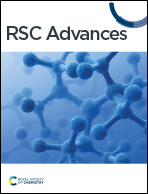Innovative microwave-assisted biosynthesis of copper oxide nanoparticles loaded with platinum(ii) based complex for halting colon cancer: cellular, molecular, and computational investigations†
Abstract
In the current study, we biosynthesized copper oxide NPs (CuO NPs) utilizing the essential oils extracted from Boswellia carterii oleogum resin, which served as a bioreductant and capping agent with the help of microwave energy. Afterwards, the platinum(II) based anticancer drug, carboplatin (Cr), was loaded onto the CuO NPs, exploiting the electrostatic interactions forming Cr@CuO NPs. The produced biogenic NPs were then characterized using zeta potential (ZP), high-resolution transmission electron microscopy (HRTEM), X-ray diffraction spectroscopy (XRD), and Fourier transform infrared spectroscopy (FTIR) techniques. In addition, the entrapment efficiency and release profile of the loaded Cr were evaluated. Thereafter, SRB assay was performed, where Cr@CuO NPs demonstrated the highest cytotoxic activity against human colon cancer cells (HCT-116) with an IC50 of 5.17 μg mL−1, which was about 1.6 and 2.2 folds more than that of Cr and CuO NPs. Moreover, the greenly synthesized nanoparticles (Cr@CuO NPs) displayed a satisfactory selectivity index (SI = 6.82), which was far better than the free Cr treatment (SI = 2.23). Regarding the apoptosis assay, the advent of Cr@CuO NPs resulted in an immense increase in the cellular population percentage of HCT-116 cells undergoing both early (16.02%) and late apoptosis (35.66%), significantly surpassing free Cr and CuO NPs. A study of HCT-116 cell cycle kinetics revealed the powerful ability of Cr@CuO NPs to trap cells in the Sub-G1 and G2 phases and impede the G2/M transition. RT-qPCR was utilized for molecular investigations of the pro-apoptotic (Bax and p53) and antiapoptotic genes (Bcl-2). The novel Cr@CuO NPs treatment rose above single Cr or CuO NPs therapy in stimulating the p53-Bax mediated mitochondrial apoptosis. The cellular and molecular biology investigations presented substantial proof of the potentiated anticancer activity of Cr@CuO NPs and the extra benefits that could be obtained from their use.



 Please wait while we load your content...
Please wait while we load your content...